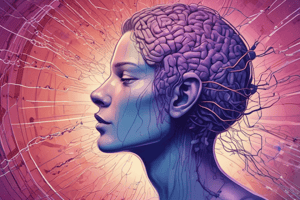Podcast
Questions and Answers
Which anticonvulsant is known for having life-threatening side effects that have severely restricted its usage?
Which anticonvulsant is known for having life-threatening side effects that have severely restricted its usage?
- Felbamate (correct)
- Carbamazepine
- Vigabatrin
- Pregabalin
Which of the following is a derivative of carbamazepine that has similar efficacy but is better tolerated?
Which of the following is a derivative of carbamazepine that has similar efficacy but is better tolerated?
- Primidone
- Valproic acid
- Eslicarbazepine acetate
- Oxcarbazepine (correct)
Which group of medications primarily blocks voltage-gated calcium channels in their mechanism of action?
Which group of medications primarily blocks voltage-gated calcium channels in their mechanism of action?
- Propionates
- Hydantoins
- Gabapentinoids (correct)
- Oxazolidinediones
What is the primary characteristic of the anticonvulsants found in the fatty acids category?
What is the primary characteristic of the anticonvulsants found in the fatty acids category?
Which of the following anticonvulsants has a historical use in treating epilepsy but is primarily used today in veterinary medicine?
Which of the following anticonvulsants has a historical use in treating epilepsy but is primarily used today in veterinary medicine?
What is the primary mechanism of action for anticonvulsants?
What is the primary mechanism of action for anticonvulsants?
Which of the following is NOT a common cause of seizures?
Which of the following is NOT a common cause of seizures?
Which type of seizure is characterized by affecting both sides of the brain?
Which type of seizure is characterized by affecting both sides of the brain?
Which neurotransmitter's activity is increased by some anticonvulsants?
Which neurotransmitter's activity is increased by some anticonvulsants?
What are febrile convulsions primarily associated with?
What are febrile convulsions primarily associated with?
Which of the following side effects could be considered serious when taking antiepileptic medications?
Which of the following side effects could be considered serious when taking antiepileptic medications?
What can be a consequence of uncontrolled electrical disturbances in the brain?
What can be a consequence of uncontrolled electrical disturbances in the brain?
Who may be at a higher risk for severe side effects from antiepileptic medications?
Who may be at a higher risk for severe side effects from antiepileptic medications?
What primarily causes seizures in epilepsy?
What primarily causes seizures in epilepsy?
What is a common psychological complication associated with untreated epilepsy?
What is a common psychological complication associated with untreated epilepsy?
Which of the following is a symptom that may occur before an epileptic seizure?
Which of the following is a symptom that may occur before an epileptic seizure?
Which anticonvulsant drug is specifically used to treat absence seizures?
Which anticonvulsant drug is specifically used to treat absence seizures?
What is the term for frequent and recurrent seizures without regaining consciousness?
What is the term for frequent and recurrent seizures without regaining consciousness?
Which of the following is NOT listed as a common symptom of epilepsy?
Which of the following is NOT listed as a common symptom of epilepsy?
What is a potential risk associated with driving for individuals with epilepsy?
What is a potential risk associated with driving for individuals with epilepsy?
Which medication is classified as an antiseizure agent for focal seizures?
Which medication is classified as an antiseizure agent for focal seizures?
Which benzodiazepine is notable for being administered rectally for seizures?
Which benzodiazepine is notable for being administered rectally for seizures?
Which of the following benzodiazepines is specifically mentioned for use during menstruation in women with catamenial epilepsy?
Which of the following benzodiazepines is specifically mentioned for use during menstruation in women with catamenial epilepsy?
What is the main reason phenobarbital is rarely used to treat epilepsy today?
What is the main reason phenobarbital is rarely used to treat epilepsy today?
Which anticonvulsant is considered the main drug from 1912 until 1938, but is now used less frequently?
Which anticonvulsant is considered the main drug from 1912 until 1938, but is now used less frequently?
Which of the following drugs is rarely used in new patients to treat epilepsy due to the availability of other effective medications?
Which of the following drugs is rarely used in new patients to treat epilepsy due to the availability of other effective medications?
What is the primary route of administration for lorazepam in a hospital setting for status epilepticus?
What is the primary route of administration for lorazepam in a hospital setting for status epilepticus?
What kind of seizures is Stiripentol indicated for treating?
What kind of seizures is Stiripentol indicated for treating?
What common effect do benzodiazepines have due to their action as central nervous system depressants?
What common effect do benzodiazepines have due to their action as central nervous system depressants?
Flashcards
What is epilepsy?
What is epilepsy?
A neurological disorder causing repeated seizures or unusual sensations and behaviors.
What causes a seizure?
What causes a seizure?
Sudden bursts of electrical activity in the brain, often caused by too much or too little activity between neurons.
How do epilepsy symptoms vary?
How do epilepsy symptoms vary?
Vary greatly between individuals and depend on the type of seizure. Range from violent shaking to hardly noticeable symptoms.
What are antiseizure agents?
What are antiseizure agents?
Signup and view all the flashcards
What is status epilepticus?
What is status epilepticus?
Signup and view all the flashcards
What are anticonvulsant drugs?
What are anticonvulsant drugs?
Signup and view all the flashcards
What are benzodiazepines used for in epilepsy?
What are benzodiazepines used for in epilepsy?
Signup and view all the flashcards
What is SUDEP?
What is SUDEP?
Signup and view all the flashcards
Anticonvulsants (AEDs)
Anticonvulsants (AEDs)
Signup and view all the flashcards
Seizure
Seizure
Signup and view all the flashcards
Convulsion (Febrile Convulsion)
Convulsion (Febrile Convulsion)
Signup and view all the flashcards
Generalized Onset Seizures
Generalized Onset Seizures
Signup and view all the flashcards
Focal Onset Seizures (formerly Partial Seizures)
Focal Onset Seizures (formerly Partial Seizures)
Signup and view all the flashcards
Unknown Onset Seizures
Unknown Onset Seizures
Signup and view all the flashcards
How do anticonvulsants work?
How do anticonvulsants work?
Signup and view all the flashcards
Common side effects of anticonvulsants
Common side effects of anticonvulsants
Signup and view all the flashcards
GABA Analogues
GABA Analogues
Signup and view all the flashcards
Anticonvulsants
Anticonvulsants
Signup and view all the flashcards
Hydantoins
Hydantoins
Signup and view all the flashcards
Gabapentinoids
Gabapentinoids
Signup and view all the flashcards
Carbamates
Carbamates
Signup and view all the flashcards
Barbiturates
Barbiturates
Signup and view all the flashcards
Phenobarbital
Phenobarbital
Signup and view all the flashcards
Benzodiazepine
Benzodiazepine
Signup and view all the flashcards
Benzodiazepines for Seizures
Benzodiazepines for Seizures
Signup and view all the flashcards
Diazepam (Valium)
Diazepam (Valium)
Signup and view all the flashcards
Clobazam
Clobazam
Signup and view all the flashcards
Status Epilepticus
Status Epilepticus
Signup and view all the flashcards
Study Notes
Anticonvulsants (Antiepileptic Drugs (AEDs)/Anti-seizure Medications (ASM))
- Used in treating epileptic seizures, bipolar disorder, borderline personality disorder, mood stabilizers, and neuropathic pain
- MOA: Alter electrical activity in nerve cells (neurons) by either blocking or stimulating ion channels (e.g. sodium, calcium, or potassium) or influencing neurotransmitter activity (e.g. GABA)
- Seizures are sudden, uncontrolled electrical disturbances in the brain, affecting behaviour, movement, feeling, and consciousness
- Three major types of seizures: generalized (both brain sides), focal (one brain area/side), and unknown onset
- Common causes of seizures include sleep deprivation, drug use (amphetamines, cocaine), certain medications (pain relievers, antidepressants, smoking cessation therapies), lack of oxygen during birth, and stress.
- Common side effects are often mild and short-lived, including dizziness, tiredness, upset stomach, or blurry vision.
- More significant side effects (though less common): low white blood cell or platelet counts, rashes, pancreas problems, aplastic anaemia (life-threatening bone marrow disorder), and liver damage.
- Epilepsy (epileptic fits/seizures) is a neurological disorder that causes recurrent seizures or unusual behaviors. Symptoms vary, ranging from mild shaking to severe symptoms.
Antiseizure Agents
- Different types of antiseizure agents are categorized by the type of seizures they target (focal, generalized, and absence).
- Medications like carbamazepine (Tegretol), gabapentin (Neurontin), lamotrigine (Lamictal), oxcarbazepine (Trileptal), topiramate (Topamax), and others are listed.
- Some agents (like benzodiazepines) can stop seizures quickly, particularly in emergencies
- Important note on some medication use with specific seizure types (e.g certain benzodiazepines useful for status epilepticus)
- Other groups include aldehydes (like paraldehyde), aromatic and allylic alcohols, barbiturates, benzodiazepines, bromides, carbamates, and others. Specific examples within each group are detailed. Note particular usage of these groups (e.g. phenobarbital as a main form of treatment in certain periods, and now less common given other treatments that have less severe side effects)
Complications of Untreated Seizures
- Prolonged untreated seizures can lead to complications such as injuries (falls, drowning), increased risk of accidents (driving), psychological issues (depression, anxiety, suicidal tendencies), and status epilepticus (frequent/recurrent seizures without regaining consciousness), along with potentially life-threatening conditions like SUDEP (sudden unexplained death in epilepsy).
Studying That Suits You
Use AI to generate personalized quizzes and flashcards to suit your learning preferences.




